UTS ALL TOPICS MIDTERM
1/184
There's no tags or description
Looks like no tags are added yet.
Name | Mastery | Learn | Test | Matching | Spaced |
|---|
No study sessions yet.
185 Terms
Aristotle
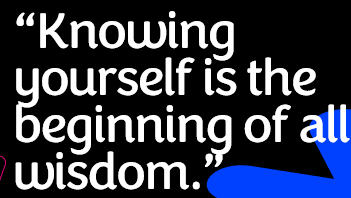
Self-Understanding
Is the ability to recognize and make sense of your own thoughts, feelings, and behaviors.

It is a cornerstone of personal growth because it helps you these three things.
Personality Traits
Emotions
Values
Strength and Weaknesses
Key aspects of self-understanding
Personality Traits
it’s a key aspect answering the question “what kind of person are you?”
Emotions
it’s a key aspect answering the question “How do you respond to situations emotionally?”
Values
it’s a key aspect answering the question “What matters most to you in life?”
Strength and Weaknesses
it’s a key aspect answering the question “What are you naturally good at, and where do you struggle?”
Personal Growth
Relationships
Stress Management
Career Development
Importance of Self-Understanding
Personal Growth
By understanding yourself, you can set goals and grow in areas that matter to you.
Relationships
When you know your tendencies, you communicate better and build deeper connections.
Stress Management
Recognizing triggers and coping mechanisms helps you handle life’s pressures.
Career Development
Awareness of your strengths and work style can guide career choices and improve workplace effectiveness.
Personality Traits
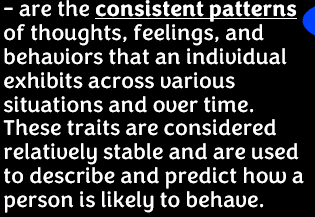
Extraversion, Agreeableness, Openness to Experience, Neuroticism, Coscientiousness
The Big Five Personalities
Consistency
Stability
Individual Differences
Key Features of Personality Traits
Consistency

Stability

Individual Differences

Biological Determinants
Environmental Determinants
Psychological Determinants
Situational Determinants
Cultural and Societal Determinants
Physical and Biological Conditions
Determinants of Personality
Biological Determinants

Genetics
Brain Structure
Physical Appearance
What are under the Biological Determinants?
Environmental Determinants

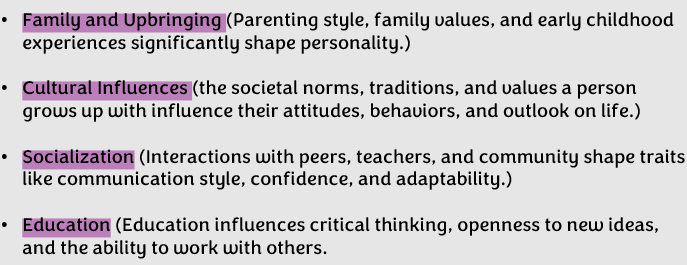
What are under the Environmental Determinants?
Psychological Determinants


What are under the Psychological Determinants?
Situational Determinants

Immediate Environment
Crises or Life Events
What are under the Situational Determinants

What are under the Cultral and Societal Influences?

What are under the Physical and Biological Determinants?
Personality Development
is a complex interplay of nature (biological factors) and nurture (environmental and situational factors)
GENETICS
lay the foundation, life experiences and surroundings shape and refine personality over time.
Self-awareness
the ability to recognize and understand your own thoughts, emotions, and behaviors.
Self-awareness
the foundation for personal growht. It helps identify strengths, weaknesses, values, and beliefs.
Self-Exploration
a deeper examination of your inner self to understand what drives your actions and decisions
Self-Exploration
helps uncover passions, purpose, and areas that need improvement.
Emotional Growth
the ability to understand, regulate, and express emotions effectively.
Emotional Intelligence
improves relationships, decision-making, and stress management.
Cognitive Development
expanding your knowledge, critical thinking skills, and problem-solving abilities.
Cognitive Development
Helps in adapting to challenges and making informed decisions.
Spiritual and Moral Development
developing a sense of purpose, meaning, and connection to something greater than yourself.
Spiritual and Moral Development
It provides direction and inner peace
Behavioral and Habitual Changes
changing habits and behaviors to align with your goals and values.
Behavioral and Habitual Changes
Consistent positive actions lead to long-term growth.
Self-Acceptance and Compassion
embracing who you are, including your imperfections, without judgment.
Self-Acceptance and Compassion
Builds self-confidence and reduces negative self-talk.
Continuous Personal Development
a commitment to lifelong learning and self-improvement.
Continuous Personal Development
Helps you adapt to change and reach your full potential.
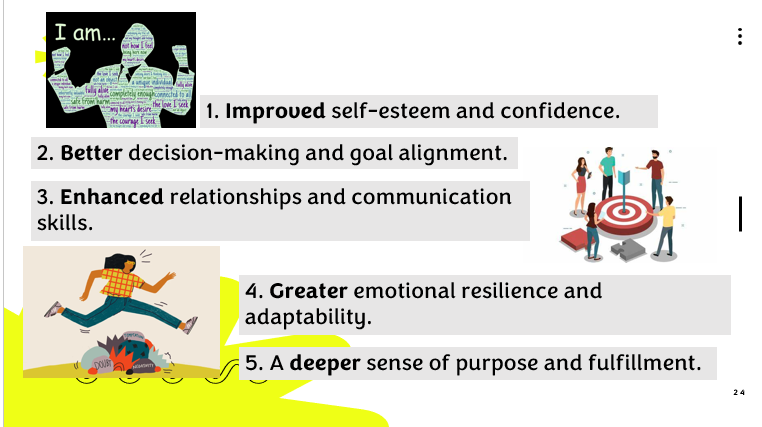
Benefits of Personal Growth in Understanding the Self.
Self
It refers to an individual’s perception of their own identity, thoughts, feelings, and experiences that contribute to who they are.
Self
-It includes awareness of one’s existence, abilities, beliefs, and place in the world.
Self-Concept
How one perceive themselves
Self-esteem
The value one places on themselves
Self-awareness
The ability to reflect on one’s own thoughts and behaviors.
Self
central to understanding one’s identity.
Personality
refers to the unique and relatively stable patterns of thoughts, feelings, and behaviors that characterize an individual.
Personality
-It is the sum of enduring traits and behaviors that define how a person interacts with the world.
Trait
are specific characteristics or tendencies that influence how an individual thinks, feels, and behaves.
Trait
a distinguishing feature of your personal nature.
Trait
They are considered the building blocks of personality.
Self
The awareness and understanding of one’s identity.
Personality
The overall patterns of behavior, emotions, and thoughts.
Traits
Specific characteristics that form the foundation of personality.
Self
Provides the foundation for exploring identity and purpose.
Self
Promotoes introspection and reflection on values, goals, and beliefs.
Personality
Offers insight into consistent patterns in behavior and emotional responses.
Personality
Helps individuals understand how they relate to others and adapt to their environment.
Traits
Enables a deeper understanding of specific tendencies
Traits
Provides actionable insights for improving behavior and decision-making.
Know Thyself
The Socratic Method
The Soul and Virtue
Dialogue and Reflection
The Unexamined Life
Socrates Concepts
Know Thyself
Self-awareness is the foundation of understanding the self. One must examine their own beliefs, nature, and actions to live a good life.
The socratic Method
A method of questioning that encourages critical thinking and self-reflection, helping individuals uncover their own ignorance and contradictions.
The Soul and Virtue
The self is tied to the soul, which requires cultivation of virtue. Virtue is knowledge, and understanding the self is essential to moral growth
Dialogue and Reflection
Engaging in dialogue and reflecting on one's thoughts leads to a deeper understanding of the self and its relationship to others.
The Unexamined Life
A life without self-examination lacks purpose and fulfillment. Continuous questioning is essential for a meaningful life
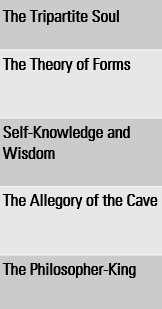
Concept of Plato
The Tripartite Soul

Rational, Spirited, and the Appetitive
The three parts of soul
The Theory of Forms

Perfect, Eternal and Unchanging Ideals
The Three Theory of Forms
Self-Knowledge and Wisdom

The Allegory of the Cave
Plato used this allegory to illustrate the journey of self-realization: from ignorance (the shadows in the cave) to enlightenment (the world outside the cave).
The Philosopher-King
The ideal ruler is one who has knowledge of the Forms and is able to govern with wisdom and justice, reflecting an ideal, well-ordered self.
Plato
He view the self as the relationship to knowledge, justice, and philosophy.
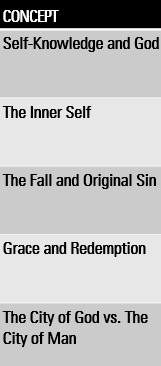
5 concepts of St. Augustine
Self-Knowledge and God
St. Augustine believed that true knowledge of the self can only be attained through knowledge of God. The self is deeply connected to divine truth.
The Inner Self
The self is discovered through inner reflection and introspection, as Augustine famously said, “I know myself only by knowing You (God).”
The fall and original sin
Augustine argued that the self is inherently flawed due to original sin. Humanity’s desire for self-centered fulfillment leads to spiritual disintegration.
Grace and Redemption
The self is redeemed through God's grace. Augustine believed that human will is free, but only divine grace can restore the self to its proper state.
The city of god vs. the city of man
Augustine contrasted the spiritual self, aligned with the City of God (focused on eternal truths), with the earthly self, tied to the City of Man (worldly concerns).
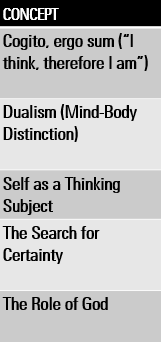
Concepts of Rene Descartes
Cogito Ergo Sum (“I Think, therefore I am’)
Descartes' foundational concept that the act of thinking is proof of existence. The self is defined by the ability to doubt and reason.
Dualism (Mind-Body Distinction)
Descartes proposed that the self consists of two distinct substances: res cogitans (thinking substance or mind) and res extensa (extended substance or body)
Res Cogitans (Mind) and Res Extensa (Body)
two distinct substances of self that descartes proposed
Self as a Thinking Subject
The self is primarily a thinking, rational subject. Consciousness and self-awareness are essential to the identity of the self.
The Search for Certainty
Descartes believed that the self must doubt everything except for its own existence as a thinking being in order to achieve certainty.
the Role of God
Descartes argued that God guarantees the truth of the self’s perceptions and existence, as God is benevolent and not deceptive.
Rene Descartes
Focusing on rational thought, dualism, and the role of God In confirming existence
Individualistic Self
emphasizes personal independence, self-reliance, and the belief that personal goals and achievements are the most important.
Collective Self
emphasizes group harmony, social responsibility, and the importance of community or family over individual desires.